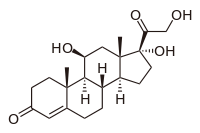
Photo from wikipedia
BackgroundAlport syndrome (AS) is a hereditary kidney disease caused by mutation of type IV collagen. Loss of collagen network induces collapse of glomerular basement membrane (GBM) structure. The previous studies… Click to show full abstract
BackgroundAlport syndrome (AS) is a hereditary kidney disease caused by mutation of type IV collagen. Loss of collagen network induces collapse of glomerular basement membrane (GBM) structure. The previous studies showed that upregulation of some tyrosine kinase receptors signaling accompanied GBM disorder in AS mouse model. EGFR signaling is one of the well-known receptor kinase signaling that is involved in glomerular diseases. However, whether EGFR signaling is relevant to AS progression is still uninvestigated. Here, we determined the involvement of EGFR in AS and the effect of suppressing EGFR signaling by erlotinib treatment on AS progression.MethodsPhosphorylated EGFR expression was investigated by Western blotting analysis and immunostaining of kidney tissues of Col4a5 mutant mice (a mouse model of X-linked AS). To check the effect of blocking EGFR signaling in AS, we administered erlotinib to AS mice once a day (10 mg/kg/day) orally for 18 weeks. Renal function parameters (proteinuria, serum creatinine, and BUN) and renal histology were assessed, and the gene expressions of inflammatory cytokines were analyzed in renal tissues.ResultsPhosphorylated EGFR expression was upregulated in AS mice kidney tissues. Erlotinib slightly reduced the urinary protein and suppressed the expression of renal injury markers (Lcn2, Lysozyme) and inflammatory cytokines (Il-6, Il-1β and KC). Erlotinib did not improve renal pathology, such as glomerular sclerosis and fibrosis.ConclusionThese findings suggest that EGFR signaling is upregulated in kidney, but although inhibiting this signaling pathway suppressed renal inflammatory cytokines, it did not ameliorate renal dysfunction in AS mouse model.
Journal Title: Clinical and Experimental Nephrology
Year Published: 2017
Link to full text (if available)
Share on Social Media: Sign Up to like & get
recommendations!